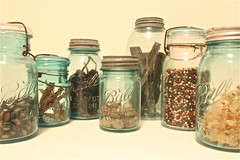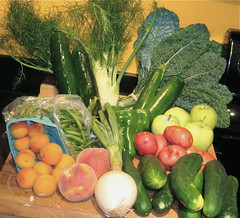She also rises while it is yet night, and
provides food for her household. It sounds like this Proverbs 31 woman put a lot of
thought and effort into the food she fed her family, as should we.
As mothers,
we are in the unique position of "provider of nutrition" to our families. We all
want what is best for our husbands and children. I would venture to
say that, like me, each of you shops with that in mind.
Now I'm sure that each
of you would go out and buy the highest quality, organic, gourmet food all the
time except for one thing - Money. Not all of us have all we want. In fact, most
of us, myself included, are on a very tight budget. If you have
plenty, more power to you! You don't need to read this post :-) If, like me,
money IS an issue, I'm going to share with you some of my tricks on making the
little you have stretch as far as it will go. :-D
First, a little about myself. We have 5 children
under 8, one of whom has a serious gluten allergy. We farm for a living, so our
income is not only sporadic but well below the government designation of "low".
I grew up in a one income household with 7 children and no farm. We have always
eaten well. You can, too! Here's how:
Be Thrifty
This, in my humble opinion, is the most important change you can
make. Now I don't mean stingy. There is a big difference! I just mean careful and reducing
waste as much as possible. How would you like it if you could add an extra 40%
to your grocery budget? Would that make healthy food more affordable? I thought
so :-)
Did you know that the average American household THROWS AWAY 40% of the
food they buy? That's like shredding $40 every time you go shopping.There are so
many ways that we can save this otherwise wasted food!
First off, eat leftovers.
At least twice a month, we pull all of the leftover bits out of the fridge
and everyone can have their favorites for supper. It's fun! :-) Sometimes I'll
make a soup with that extra half an onion, open tomato juice, 3 limp carrots,
and whatever else I can find. "Mus-go" soup (this mus-go, that mus-go) is one of
our staples.
Don't let anything sit long enough to go bad. If you have
a garden or animals, veggie scraps can be fed or composted, but first make
veggie stock out of them. Toss your onion peels, carrot tops (leaves too!)
and other trimmings into a pot with a pinch of salt and cover with water. Simmer
for a couple of hours, then strain. These parts are tossed, not because they
aren't edible, but because they are tough.
Broth extracts the flavor and
vitamins, and stretches another use from "waste". This can be done with the
carcass from a turkey or chicken roast too, or beef or ham bones. Meat
stocks need simmered longer, either all day, or overnight. The crockpot comes in
handy when you want to do a batch overnight :-)
Before you make stock out of
that chicken carcass, pick the last of the meat off the bones. This can be
chopped and saved for topping homemade pizza, or added to a pasta dish. Beef or
lamb scraps make a great hash for breakfast, or sandwiches for packed
lunches.
Cheese can be shredded and frozen so it won't go
moldy. If it's a little dried out, you can always toss it in a casserole.
Remember, a penny saved is a penny earned :-)
Your Assignment (should you choose to accept it): Go open your fridge, right now. Toss anything totally unsalvageable. Take stock
of what's left, and how soon it needs used up, then decide how you will use it
before it goes to waste. Don't forget to do it :-)
Buy in Bulk
Many things cost less than half price if you buy in
bulk.
For example, plain old Uncle Ben's brown rice is
2.79 for 14oz at the local grocery store. That's 3.19/lb. I can get a bigger bag (32oz) of a better rice
(Lundberg, organically grown) for 3.99, which is 1.99/lb. But, if I really want to save money, I'll get a 25lb
bag of Lundberg through our local co-op for 28.50, cutting my cost down to
1.14/lb.
 The same goes for flours (even gluten-free ones)
sugar, salt, pasta, and many other things. It's simple enough to go to a
local restaurant and get plastic icing buckets or glass pickle jars to
store things in, usually for less than $1 each. Often I have found that by buying in bulk, I can
get higher quality food, for a better price, as in the example
above.
The same goes for flours (even gluten-free ones)
sugar, salt, pasta, and many other things. It's simple enough to go to a
local restaurant and get plastic icing buckets or glass pickle jars to
store things in, usually for less than $1 each. Often I have found that by buying in bulk, I can
get higher quality food, for a better price, as in the example
above.
Your Assignment: Find one item you can buy in bulk
to save money. Figure out how much you saved. :-)
Shop the Sales
This is especially important for luxuries like candy, olives, and
pre-made baked goods. I even buy necessities like chocolate on sale! ;-)
Coupons are nice but usually not available for
real food, unless you find the occasional one online. When shopping online, be
sure to search for coupon codes before checking out. I've saved lots this way,
especially when I pair the codes with a good sale. Clearance carts at the store, as
well as online, are a great cash saver as well.
 By far my favorite sale, though,
is the salvage grocery. Also know as bent-n-dent or outlet stores, these
places sell the stuff that the big grocery stores write off as a loss. When the
supplier sends the wrong shipment or when a skid drops
off the loader and dents some boxes, this is where it goes. When a jar breaks and wets the labels of a
dozen others. When products are discontinued, out of season, close to
expiration, or just don't sell.
By far my favorite sale, though,
is the salvage grocery. Also know as bent-n-dent or outlet stores, these
places sell the stuff that the big grocery stores write off as a loss. When the
supplier sends the wrong shipment or when a skid drops
off the loader and dents some boxes, this is where it goes. When a jar breaks and wets the labels of a
dozen others. When products are discontinued, out of season, close to
expiration, or just don't sell. Granted, you have to be careful, there are dented cans and expired stuff. You need to know what to check, and you never know what you'll find :-)
I get gourmet chocolate, you know, the organic, high-end stuff, for .50 cents a bar, organic and gluten free cereals for 1.45/box, and black olives for .50 a can. If you can identify why it's there, you can find out if it's a good deal.
Organic dry goods are often expired, but don't buy those. They have no preservatives and so aren't good past expiration, especially if they have fruit or nuts in them.
Canned and jarred goods with torn or damaged labels are fine. Boxes that are dented are only aesthetic, the contents are generally unharmed. Expired coffee beans are perfectly good. You get the idea. :-)
Assignment: Find a salvage grocery in your area,
andvisit it at lease once :-) Here
is a good start, or you can call the local health department, since they issue the
licensing.
As I am running a little shy on space, we will
continue at a later date.
Join me next time to learn more about:
Cooking from Scratch
Eating at Home
Growing your Own
Marion Yoder


No comments:
Post a Comment